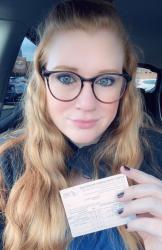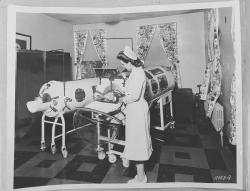For DaVita registered nurse Samantha Guess, nursing is a calling. After all, it runs in the family. Her grandmother, Alice Lofland, cared for polio patients as a registered nurse back in 1951. From her stories, Guess understood the fulfillment of being a nurse long before she became one.
After her grandmother passed away, Guess helped her dad sift through his mother’s nursing relics, which included a photo of her all-female nursing class, a dusted off 1953 issue of Nursing Journal and a picture of Alice standing next to the iron lung, a machine then used to treat polio patients.
“When I saw this photo, it sparked something in my brain,” Guess reflected. Throughout unique challenges that face each generation, “the sense of support and community caring is the one constant in nursing.” Her grandmother cared for patients during the polio epidemic. Today, Guess continues to serve on the front lines of COVID-19 and supports hospital patients who need dialysis treatment in central Virginia.
Guess’ dad, Randy Lofland, could not be prouder of this family legacy living on. He remembers how his mother poured her heart into her work and sees the same in his daughter today.
His mother cared for patients at Perry Point VA Medical Center in Maryland. “She took her work personally,” he recalled. “They often wanted to make connections, and she was their connection to the outside world.” Some polio treatments required patients to live in the iron lung for up to a month at a time to help their respiratory muscles recover from paralysis.
While the first significant polio epidemic occurred in the U.S. in 1894, there wasn’t a vaccine distributed until 1955.[1] The impact was devastating. In the early 1950s before a vaccine became available, polio caused more than 15,000 cases of paralysis a year in the U.S.[2]
Following the vaccine’s distribution in 1955, the risk of contracting polio was essentially eliminated in the U.S.
It took seven years for Jonas Salk to develop the polio vaccine. Decades later, his son, Dr. Peter Salk, has celebrated the progress demonstrated by the COVID vaccine’s development in less than a year.[3]
The patients Guess supports continue to have access to the vaccine at their DaVita center. Guess received her COVID-19 vaccine when it became available to essential workers last December. Vaccines today are developed with more resources, better technology, transparency in ingredients, and advanced science to back it all up.
Even as medicine has evolved, the personal touch of nursing has remained. “My hope,” Guess shared, “is that each person considers researching the COVID-19 vaccine through reputable sources to make the best decision for themselves and their family.”
[1] https://www.britannica.com/science/polio/Polio-through-history













